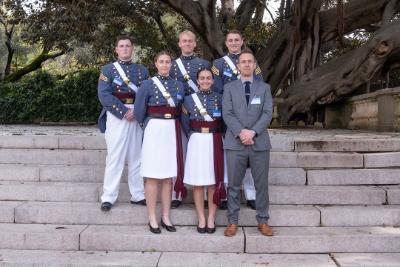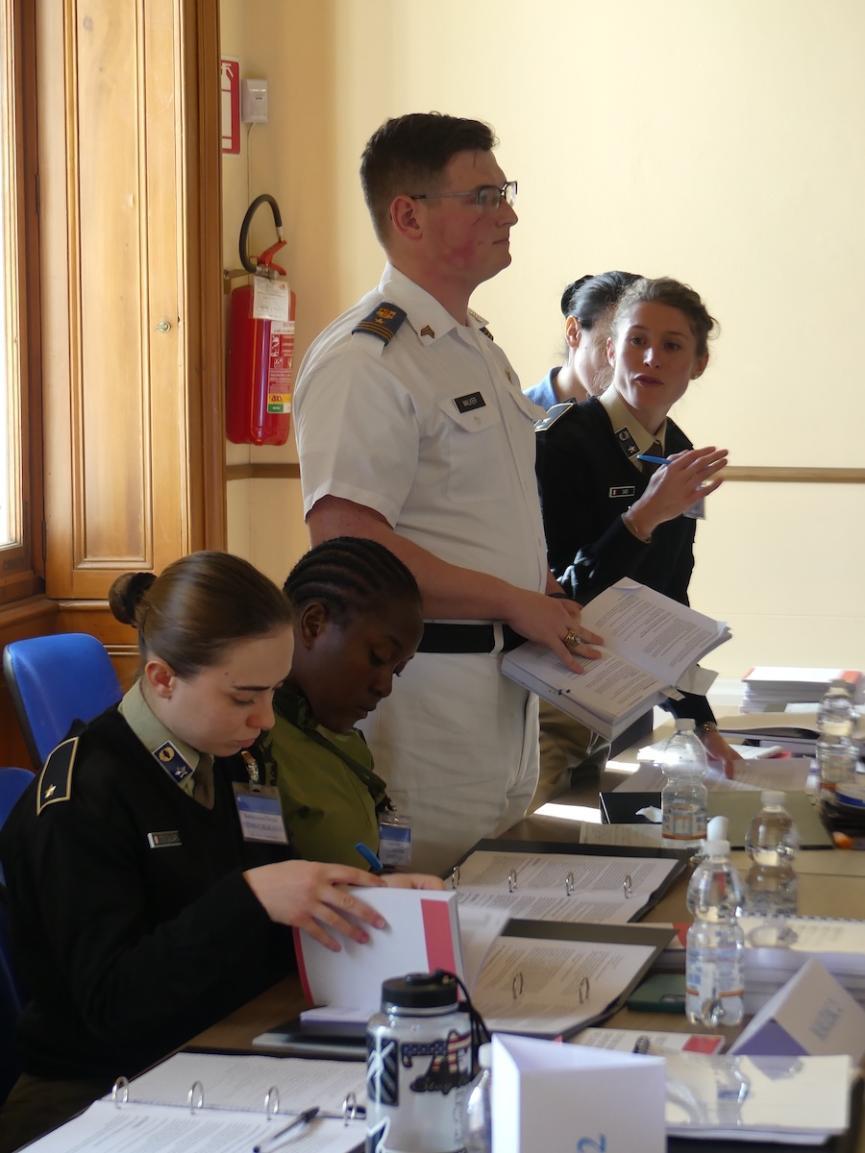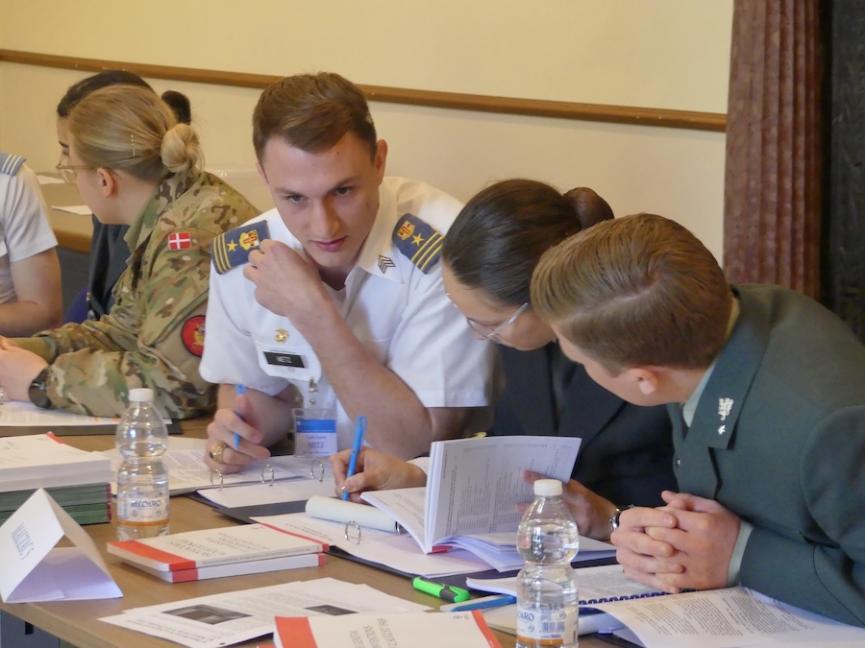VMI Brings Home Another Record from War Conflict Scenario Competition in Italy
LEXINGTON, Va. April 23, 2025 — A team of Virginia Military Institute cadets recently participated for the 14th time in the Competition on the Law of Armed Conflict in Sanremo, Italy. This year’s competition brought together over 100 cadets from 29 military academies drawn from 17 different countries. VMI continued its exceptional form at the competition, winning four gold awards and one silver. For the second year running, this was the most awards won by a single academy.
VMI was one of six U.S. military colleges involved in the competition, with others including West Point, U.S. Air Force Academy, U.S. Naval Academy, Coast Guard Academy, and the Citadel.
The event, hosted by the International Institute of Humanitarian Law, places cadets in mixed teams to provide legal analysis on a fictional war scenario. Cadets spend three days in “Joint Operations Command” centers advising their commanders on how the war should be conducted in accordance with international law. 
Four cadets – Audrey Davis ’25, Delilah Martindale ’25, Aaron Metz ’25, and Christian Walker ’25 — won gold medals for their mixed team performances, while Walker won the overall individual silver medal.
Cadets are chosen for the competition after completing a course on the Law of Armed Conflict with Maj. Tim Passmore, assistant professor of international studies, and then receive additional training and preparation as a team before the competition. In 2012, VMI started participating in the competition under Col. Robert James' direction, who now serves as a judge.
The competition consists of cadets serving as legal advisers to a commander in a fictional war scenario simulation, according to Passmore. Cadets are divided into mixed teams of three, where they work with cadets from other academies. Each team is given a scenario, which develops over the week as new information is revealed. The teams must advise the commander on the legality of the various actions their military can take.
“This year’s competition was a wonderful experience in a variety of ways. It was the largest, and most diverse, year in the competition’s 23-year history, with cadets coming from as far as Japan, Thailand, and Mozambique, while new teams traveled from Burundi, Lebanon, and Kosovo,” Passmore said.
The competition allowed VMI to showcase talented cadets in an international setting, Passmore said. Those participating were able to display their high academic standards, as well as the character of VMI cadets.
“It is also a formative, and, in many cases, life-changing, experience for our cadets. Beyond just international travel, they spend a week interacting with foreign cadets, many of whom will be leaders in the future,” Passmore explained.
He also noted the experience has provided some inspiration for those who attended.
"Cadets have decided to attend law school after attending the competition, while others have gone on to excel as commissioned officers with some of the skills honed during this experience,” he said. “I regularly hear from former cadets who tell me how much this experience impacted them personally and professionally.”
This year was also different than in the past, with more cadets representing more academics than ever before in the competition’s two-plus decades.
“The standard of knowledge and preparation also seems to rise every year, continually pushing our cadets to a higher level,” Passmore commented.
This year’s team had less time to prepare than in recent years, Passmore shared, since he was on sabbatical last fall. He had to give two cadets a crash course in the material since they were unable to take his Law of Armed Conflict class.

Walker said the conference is a once-in-a-lifetime opportunity. He was intrigued to take the class because of his love for law and with his intent to attend law school next year. His goal was to increase his knowledge of different sectors of the law. It was also his first time out of the country.
“Once we began the competition, I found myself interacting with cadets from all over the world who, although they had different experiences, all had the same interest in regard to the Law of Armed Conflict,” he said. “Every day, we would be thrust into new situations that made us think critically about legal questions that arose during the planning of a simulated operation. Through asking these questions, we had to work together to ensure that our answers were crafted to address the legal intricacies of the matter at hand.”
He urges anyone who would be casually interested in this type of competition to take the plunge and do it.
“This is an experience that will stay with you for the rest of your life and will allow you to build bonds with people who you may interact with as a part of your future career, whether you commission or enter the private sector,” he explained. “It also allows you to increase your ability to think critically regarding a very difficult subject which is something that is invaluable as a young leader.”
Davis was one of the cadets who didn’t take the Law of Armed Conflict class. Instead, she applied for the team and ended up with a slot. She said the competition was based around a theoretical situation involving the outbreak of an international war. Competing in teams of three, they were assigned to a country in the coalition.
“Although most of us will not become legal advisors, it gave us great insight into joint operations and what our roles as military officers would be,” Davis said. “I think experiences like this teach future officers that those from other countries are just allies we do not know yet, rather than people to fear because we do not know them.”
Martindale said the competition was a bit outside her comfort zone.
"It really pushed our team to socialize and work with others with whom there was a huge language barrier,” she admitted. “However, it was also one of the best experiences of my life. You get to be immersed in all the different cultures that attend the conference, which is a learning experience in itself. Then, for the actual competition aspect, it was definitely a challenging situation, but we were trained so well, we knew how to handle it.”
In the end, Passmore said he was incredibly proud of the cadets who competed.
“From beginning to end, they conducted themselves with the utmost character and maturity, and were a true credit to VMI,” he said. “They continued the great work our cadets have done in recent years to in strengthen VMI’s reputation among foreign military academies.”
Laura Peters Shapiro
Communications & Marketing
VIRGINIA MILITARY INSTITUTE
.svg)
.png)
